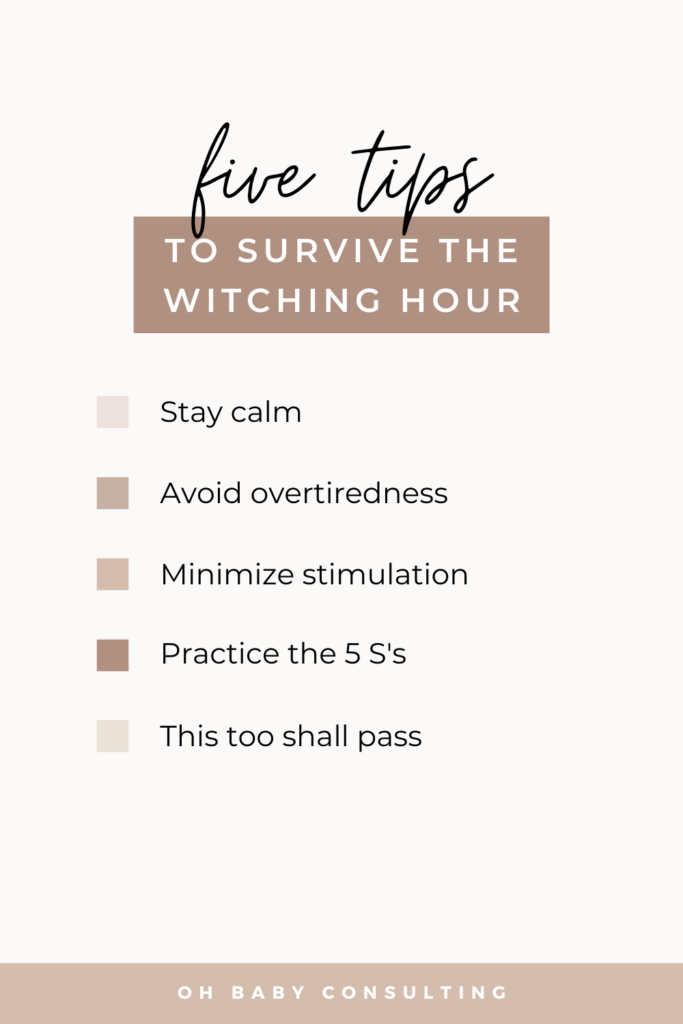It’s that dreaded time of day again! Your usually easy-going, happy-go-lucky baby is suddenly possessed and melting down. All your attempts to soothe them are falling on deaf ears and now you too have tears streaming down your face. What the heck is happening!?
What is The Witching Hour?
The witching hour (which in actuality is often multiple hours) is a common phrase used to refer to the period of time when an otherwise content newborn turns into an extremely fussy one. This usually happens somewhere between 5-11pm, and any calming methods that typically work during other parts of the day seem to have no impact on easing your baby’s cries.
5 Tips to Survive the Witching Hour
While the witching hour can be a very normal part of your baby’s development, there are many things that you can do to ease and even avoid this tumultuous part of the day.
- Stay Calm – Your baby feeds off of your emotions. If you are stressed, frazzled, and feeling overwhelmed, they can feel it. It’s a nearly impossible feat to stay calm and relaxed while holding a screaming baby, so tag-team (if you can) and take a moment to breathe and refocus. If you can keep your cool and remain calm, your baby can relax in your arms.
- Avoid Overtiredness – A newborn’s wake windows are super short at this age – we’re talking 45-60 minutes MAX – and they can get overtired so quickly. The longer your little one stays up between periods of sleep (especially if those sleep periods were very short) can cause them to become quite overtired by the end of the day. An overtired baby will have enormous difficulty falling asleep, staying asleep, and tends to fight sleep more than a well-rested baby. Compounding tiredness can exacerbate the witching hour so make sure you’re napping your little one often during the day.
- Minimize Stimulation – Our world can be extremely overstimulating to a baby who has just spent the last 9 months in a dim, muffled, protected environment. In the later hours of the day, the brain can become inundated and overwhelmed with sensory input, especially if this is a time of day that involves a lot of hustle and bustle (maybe older siblings are home, you’re trying to get dinner ready, your partner is arriving home from work, etc.) This overstimulation can send your newborn’s central nervous system into overdrive and increase fussiness and crying. If you can, dim the lights, reduce the noise, even step away from the action for a little bit to give your baby a shot at relaxing.
- Practice the 5 S’s – When done in a sequential order, swaddling, side/stomach hold, shushing, swinging, and sucking have all been shown to soothe a very fussy baby. The key is to add on to each step one-by-one until your baby calms.
– Swaddle: Wrap your baby up – this helps them feel safe, mimics the womb, and keeps the moro reflex at bay.
– Side/Stomach Hold: Instead of cradling your baby, hold them on their side or have their tummy resting on your forearm – kind of like holding a football.
– Shushing: Hold your baby cheek to cheek and make a “shhhh-shhhh-shhhh” sound past their ear.
– Swinging: Inside the womb, your baby was rocked every time you moved. Sway your body from side to side to recreate that familiar & comforting feeling.
– Sucking: Offer a pacifier or even your clean finger. Non-nutritive sucking is very soothing to newborns. - Repeat After Me: “This Too Shall Pass” – The witching hour is just a phase. As your baby grows and develops a more mature central nervous system, this will pass. It doesn’t mean it won’t be hard in the moment, but it won’t last forever.
If you are struggling with your newborn’s sleep and would like more guidance and support, my Newborn Sleep Guide and 1:1 packages are a fantastic resource to set yourself up with the confidence and clarity to build a lifetime of healthy sleep habits.














